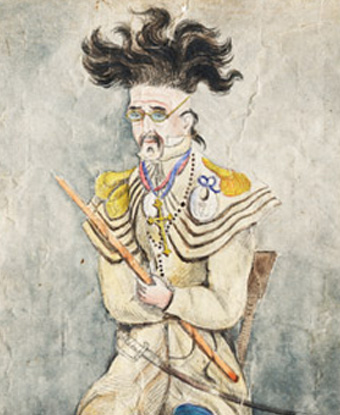Last updated: September 14, 2017
Person
Mookmanish (Little Bad Knife)

Canadian War Museum
Mookmanish (Little Bad Knife, or Little Knife Nobody Cares About) was described by Odawa chief Assiginack as an “eminent war chief who distinguished himself during the late American War.”
During the Prairie Du Chien battle in 1814, Mookmanish and his warriors engaged and killed nine American soldiers. One American, who severely wounded Mookmanish in the knee, was captured and taken prisoner. The war party wanted to take the life of the prisoner for wounding their war chief but Mookmanish forbade the killing of a captive. His humane actions would later be recognized and rewarded. On June 8, 1815, British Commander at Fort Mackinac, Lieutenant Colonel Robert McDowell, described Mookmanish as an “Indian of the most respectable character, a brave warrior and has always been distinguished.” The theme of humanity would later become a hallmark of leaders such as Tecumseh, Shahbenay and Mookmanish.
In the tradition of Odawa warriors, Mookmanish most likely followed the ceremonies and protocols of warriors going on the war path. This included adorning oneself with paint, ceremonial hairstyles and tattoos, traditional signatures of Odawa men heading into battle. In addition, ceremonies such as fasting, participating in specific dances and songs, as well as large community feasts were taken up to invoke courage and call upon help from the Manidiouk (spirits) that would guide the Odawa.
